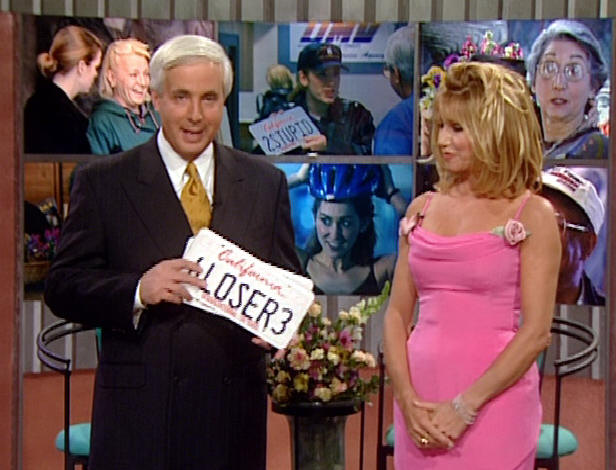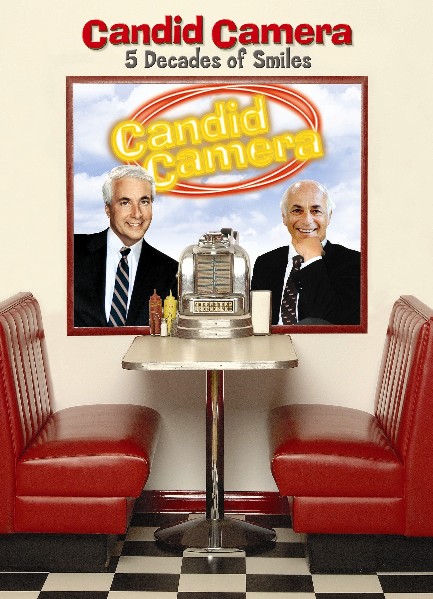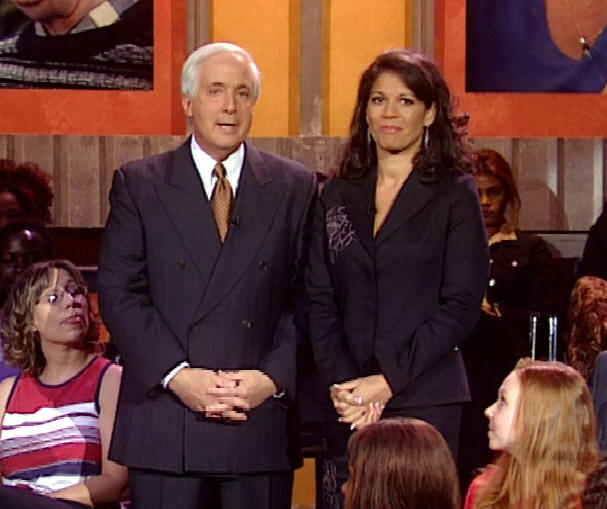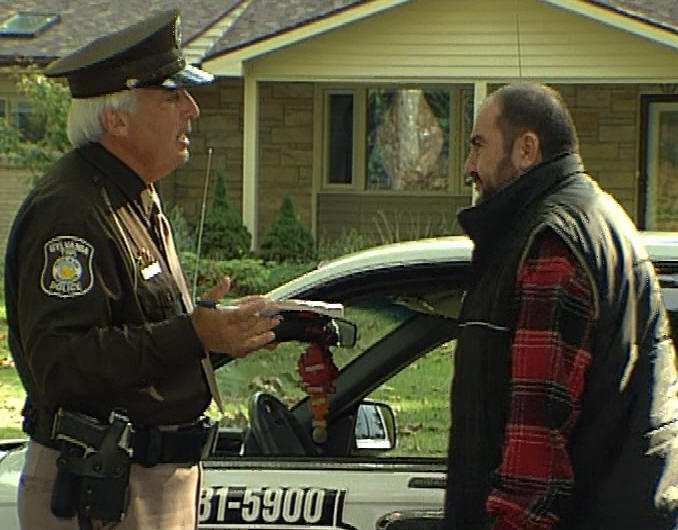Copyright ©2005
PopEntertainment.com. All rights reserved.
Posted: October 16, 2005.
With Rhinoís release of the most classic of Candid Camera
broadcasts (Candid Camera: Five Decades of Smiles), we can relive
and re-examine the show that not only entertained us, but taught us
about human nature.
The
concept was nurtured and taken to icon status by its late host and
producer, Allen Funt. His son, Peter, has taken the legacy to new extremes,
while facing the challenges of presenting this American classic in a new
century and in a new age of technology (not to mention an age of
decreasing attention spans).
For
more about the Rhino collection, go to
www.popentertainment.com/candidcamera.htm. Meanwhile, here we caught
up with Peter Funt to revisit this pop-culture phenomenon and to celebrate
its rich history.
What is the status of Candid Camera now?
Weíre working on the answer to that question. I would say Candid Camera
has always been a case of history repeating itself, which is to say that
itís been on and itís gone away for a while and it comes back in specials
or on cable or on video or whatever. I will assume that that will continue
to be the case.
At
the moment, Iím biding my time. Iím not exactly thrilled with the glut of
so-called reality shows that are currently on TV. Thatís not so much a
knock on any particular show. Itís just to say that itís draining to see
that much material from that genre.
I
think that ďrealityĒ is a terrible choice of words. One thing that all of
these shows have Ė and I would even include Candid Camera in that Ė
is the absence of reality. Itís not real when a car breaks in half
-- and itís not real when you take three of four thousand people and
audition them for a show on which youíll wind up with five or six. Whatís
real about that? By the time that audition is over, the cast of
Survivor or Fear Factor or whatever has more in common with
actors and actresses than they do with people off the street.
Iím
talking about semantics here. I do think that Candid Camera has a
lot of value in the social and psychological arenas and could be viewed
and studied on quite a few different levels. Thatís a proven fact because
as we speak, the material is used in colleges and universities, and
corporate training and hospitals.
The
time is not exactly right [to bring the show back]. Itís a little crowded
out there. Iím glad we had the Rhino project to work on. I donít really
want to do exactly the same old thing over and over again, but on the
other hand, the reason that Candid Camera has lasted as long as it
has is because our world keeps giving us new things to study: computers,
fax machines, cell phones, pagers, etc. And unsuspecting people Ė new
subjects Ė are being born faster than we can possibly photograph them.
Itís truly an idea that will never run out of steam.
 Your
father [Candid Camera creator and original host],
Allen Funt, was
the inventor of this concept and its champion. How did the idea come to
him?
Your
father [Candid Camera creator and original host],
Allen Funt, was
the inventor of this concept and its champion. How did the idea come to
him?
Way
back in the mid forties, [my father] had the job of recording Ė with an
old fashioned version of a tape recorder on wax disks Ė messages from the
GIís to send home to their parents or loved ones. There was a recording
booth, and he would ask them to rehearse, something like ďhi, honey, Iím
doing fine.Ē Once they had it down pat, the red light would come on and
they would record the thing and send it off.
My
dad found that they rehearsed very well, but when the red light would come
on, they would get tongue tied and inhibited. The long and short of it is
that the Army was wasting a lot of money on these disks. You could only
record on them once. In an attempt to save Uncle Sam some money, my dad
hit on the idea of disconnecting the red light and telling guys they were
rehearsing when he was actually recording. He got much better results that
way.
When he got out of the Army, he decided that maybe there was something
commercial in that little process. He got some seed money from Mutual
Radio Ė $900 to be exact Ė to do a sample of the Candid Microphone
radio show. When that sample was done, Mutual passed, but ABC Radio bought
the show, and thatís how Candid Microphone came to be, in 1947.
The
following year, it went on television. That really began a fifty-year
odyssey for my dad Ė what this one simple idea could lead to: movie shorts
in theaters, network television, cable television, specials, series,
record albums, books, three theatrical movies, one of them X-Rated [What
Do You Say To A Naked Lady?], and foreign versions of the show.
It
also led to non-profit laughter therapy, and college and corporate
training. Very few television shows Ė if any Ė can make the claim of
longevity equal to Candid Camera, and its applicability to other
fields, such as education and information training.
Itís not the kind of thing you can plan for. Itís the type of thing that
happens. Luck is the intersection of a good idea and good fortune.
Youíve been associated with the show your whole life. Did you figure you
were going to take the ball and run with it, and continue your fatherís
legacy?
I
certainly had other goals. I helped my dad as early as age three, and
during my teens, I was often on locations, whether it be getting coffee or
getting releases signed. In my adult life, after college, I was the
publisher of a successful cable television magazine [On Cable]. I
was with ABC News in New York for four years. I spent several years as a
free-lance writer and wrote dozens of articles about the media for The
New York Times and other publications. I came around full circle and
rejoined my dad and took a full-time interest again in his work.
 A
lot of people who follow in their fathersí footsteps or take over the
family business are often suffocated by the success of the guy who
preceded them. Even if you take over your dadís butcher shop, people will
say, ďPeter doesnít slice the roast beef the way Allen
did.Ē That sort of comes with the territory. Itís good to do
other
things -- in my case, working in journalism and broadcasting and
publishing, so
that when I do get into the family business,
I donít feel that I am
100% dependent on my dadís success as my reason for being
here, although I give him all the credit in the world.
A
lot of people who follow in their fathersí footsteps or take over the
family business are often suffocated by the success of the guy who
preceded them. Even if you take over your dadís butcher shop, people will
say, ďPeter doesnít slice the roast beef the way Allen
did.Ē That sort of comes with the territory. Itís good to do
other
things -- in my case, working in journalism and broadcasting and
publishing, so
that when I do get into the family business,
I donít feel that I am
100% dependent on my dadís success as my reason for being
here, although I give him all the credit in the world.
Candid Camera
is his baby. I hope history will always note him as Americaís #1 people
watcher. Iím totally happy and proud be Americaís
#2 people watcher.
There were a lot of imitators of
Candid Camera
over the years, but not like the original.
Even if they come on and make a big splash Ė one, for example, was called
Spy TV on NBC Ė which was a very direct imitation of the hidden
camera concept -- as big a splash as they made, they had a half life of
about thirteen weeks. They were truly flashes that came and went and
disappeared.
Well, why? What gives here? There are fundamental ingredients in what we
do, and the other people who try them are either unaware of them or are
aware of them but think they have a better way to do it. On that list Ė
first and foremost Ė is a genuine interest in and a compassion for the
public that we photograph. So many derivative shows come at this with what
seems to be a predisposition to thinking that people are stupid. We come
at it exactly in the opposite way Ė that people are wonderful Ė and they
are pretty darn smart.
Yes, we show them at times being fools or being confused, but they almost
always reflect how we all might behave if we were caught in a similar
situation. There is always some sort of redeeming value in what we are
doing.
We
never lose sight of the fact that it is entertainment. Iíve done 137
weekly half hours and another twenty hour-long specials myself. One of the
things Iíve tried to do in that period was to get more different reactions
of people reacting to the same thing. My dad would often show the best one
or two. I would often show the four or five or six best people. Even if
the reactions are somewhat similar, there is something to be learned from
seeing the similarities. There is also something to be learned from seeing
different reactions. It also enhances believability.
Candid Camera
is a very eclectic mix of things you can do with a hidden camera. One
sequence in the show might be a ha-ha practical joke type thing;
one sequence may be a pure observational piece of how people walk up and
down stairs, where there is no gag at all and we are truly a fly on the
wall. By the way, that truly is reality. We hide a camera without
influencing the situation and watch people do something. For
instance, my dad did a great thing in the sixties that I still find
enjoyable to this day: people licking stamps in a post office. We just
watch people and how they lick stamps.
 How
do you come up with your ideas and how do you put them into action?
How
do you come up with your ideas and how do you put them into action?
Itís not brain surgery. During my dadís time, most of the ideas came from
his fertile brain, and for me Ė for better or worse Ė it was the same. We
do have people around the office with ideas, and certainly the public
sends in their ideas. [My dad and] I try to be aware of the little things
that drive people crazy or are confusing. We try to make a scenario out of
that.
The
process is to come up with an idea that you think will work, and then to
send somebody out to find a location where theyíll let us do it -- and
then wait for unsuspecting people to step in. If people donít sign the
release, then we just destroy the footage. There is no archive of all of
this unreleased footage. It gets easier and easier over the years if you
are a known entity, and trusted, thanks to my dad.
One
of the things I
have to do as the day goes on is a mental tabulation of what weíve got [on
tape so far] because the situation keeps changing.
Sometimes the environment gets a little ďhot.Ē A few people have seen this
and they want to linger on the sidelines. You hope to get it early,
because as the day goes on and the word spreads, it can get tougher and
tougher. We stop for as long as necessary to let things quiet down again,
sometimes for as long as an hour or so until weíre certain that things are
back to normal. Sometimes we can knock off by lunch. Other times, we have
to spend two days.
When you go out in public when you are not in production, are you able to
have normal interactions with people, or do they become suspicious and
think that you are filming them?
By
and large, my dad and I had either the curse or the blessing of blending
in. I donít know exactly why that is. Itís mostly context and distraction:
you really donít suspect that the guy wearing a policemanís outfit and
writing the ticket is the guy from television. You are usually distracted
by the immediate problem of getting a ticket or whatever else is going on.
Invariably, people say, ďoh, of course, I watch the show all the time! Why
didnít I realize that?Ē
Like anybody else who spends time on television, there are fans who come
up just to say hello and then there are people who come up to you because
they think youíre working. I always assume that itís more joking than
serious, when they say, ďyouíre not photographing this, are you?Ē or
ďwhereís the camera?Ē
Candid
Camera
also plays a small role in helping critically ill people.
The
Laugher Therapy Foundation is a non-profit organization that we operate.
My dad started it in the late seventies, after being influenced by the
late Norman Cousins, the writer. [Cousins] wrote a fairly important book
called Anatomy of an Illness. In that book, he recounts his own
illness and found that for every half-hour of Candid Camera that he
watched, he was free from his debilitating pain for about four or five
hours. Laughter was helpful in easing his pain, and it seemed that
Candid Camera in particular, was very useful for this.
My
dad and he began to conclude that maybe it was something about the
real-life setting and the real people [that seemed to be effective]. Weíre
not scientists or doctors. We just know what weíre told, and it was
significant when he wrote about it in his book.
My
dad set up this charitable organization and the idea simply was Ė and
remains to this day Ė that if these tapes and films of ours have such use,
why wouldnít we want to get them into the hands of as many similarly
suffering people as possible?
The
organization sends tapes to critically ill people at no charge. Itís a
series of four packages. Itís been going on since the late seventies. Iím
happy and, in fact, proud to continue doing that. We have a file cabinet
bulging with letters from people attesting to its various benefits. Maybe
a large part of that is just psychological, but then again, whatís wrong
with that?
The Candid
Camera
library is also used for education and training in the academic and
corporate environments.
The
first step in that was back in the late sixties when my dad decided to
make a donation of hundreds and hundreds of Candid Camera sequences
on film to his alma mater, Cornell
University. He gave it to the psychology department, and the school spent
a lot of time cataloging it and breaking it down. That continues at
Cornell to this day.
Along the way, there were also instances where our material was used in
corporate training environments. A lot of big companies have training for
either customer service or marketing where sometimes the Candid Camera
footage was useful in showing either a bad example of customer service, or
even a good example.
What have you learned about human nature during all your years with
Candid Camera?
 What
Iíve learned in the time that Iíve been doing this is that people are by
and large good
sports. They are more often than you think willing to take a joke at their
own expense; they are able to take pleasure in a good joke that doesnít go
too far, even if they are the target of that joke.
What
Iíve learned in the time that Iíve been doing this is that people are by
and large good
sports. They are more often than you think willing to take a joke at their
own expense; they are able to take pleasure in a good joke that doesnít go
too far, even if they are the target of that joke.
The
other thing Iíve learned is that people are a bit a little too gullible,
and I worry about that. One of the expressions of that is the blind
willingness to accept perceived authority. Yes, weíre all taught to obey
what a police officer says. Weíre all taught to obey what a teacher says.
Even the boss in a business environment is an authority figure whose
instructions have to be followed. But I think there is so much of that in
our world that we are at risk of being taken unfair advantage of Ė and I
donít mean by folks of the Candid Camera show Ė we just try to
point that out. I mean by con people or other unsavory characters. That
worries me. That really worries me.
For more information on Candid Camera, log onto
www.candidcamera.com.